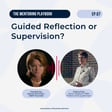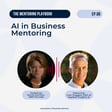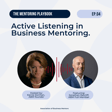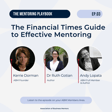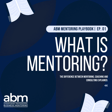Become a Creator today!Start creating today - Share your story with the world!
Start for free
00:00:00
00:00:01

All Things Professional Business Mentoring
In this month's episode, ABM Founder Kerrie Dorman speaks with mentoring thought leaders and authors Prof David Clutterbuck and Prof Bob Garvey about all things mentoring & coaching.
Recommended
Transcript
Introduction to ABM Mentoring Playbook Podcast
00:00:01
Speaker
Hi, welcome to the ABM Mentoring Playbook. This is your podcast on all things mentoring, tools, techniques, and best practices. I'm your host, Kerry Dorman. I'm the founder and chief ambassador of the Association of Business Mentors. And every month I'm going to be speaking with an expert guest about a specific tool to help you elevate your mentoring practice. So without further ado, let's crack on to this month's episode.
Meet the Mentoring Gurus
00:00:31
Speaker
and then So, good morning professors. I'm very excited to have you both with me here today on the Mentoring Playbook podcast here at the ABM to talk about all things mentoring. And so, first of all, I'll just introduce you in your completeness. So, we've got Professor Bob Garvey and we've got Professor David Clutterbuck.
00:00:54
Speaker
And you two have to be the international gurus of our men um our mentoring industry with everything that you've achieved. Would you agree? I know you're both humble. that job yeah Yeah, some of the time. I think ah a guru, I always think of gunu, which is something to get shot and step on a wall. Oh, dear. Okay.
How It All Began: The Sheffield Conference
00:01:19
Speaker
let's veer away from that then but there's there is a question i have been dying to ask you both for for a long time which is how you both met oh wow well yes go ahead both yeah I know the answers to that. um So, I mean, it was it was way back in the mists of time. And ah I received a letter from, said David Clutterbuck, inviting me to a an event, a conference, um which was at Sheffield Business School hosted by David Megerson and David Clutterbuck. And I believe that's where we first met.
00:02:01
Speaker
And we had a conversation about mentoring. There was a healthy handful of people there. And I was doing a PhD on mentoring at the time and David invited me down to see him down south. And I went and poked around in his library. And next David said, take whatever you want on one condition that your PhD thesis is lodged in my library.
00:02:27
Speaker
um and return stuff when you finish with it. So that's what happened, I believe. Yeah, that's about pretty accurate, I think, yeah. And we've sort of bounced around together and all sorts of interesting projects together, it was it.
00:02:40
Speaker
Yeah, exactly. Yeah, exactly. I was over quite a long period. Can I ask how long? ah It was 1990s. Yeah. We started. Yeah, 1992. 1992 when David Dabegus and I put together the first conference, and I think it's the same. Well, it was probably that one actually, 1992 that we actually actually had the conference.
00:03:03
Speaker
Yeah, it was the first one, I think. Yeah. you're not So 1992. Yeah. Yeah. And he suggested I went to go and see, meet, meat um make an appointment, see David Megansson as well. So I did that following that. So yeah.
A Journey Through Mentoring Literature
00:03:15
Speaker
Yeah. Gosh. And since then you've, between the two of you, you've written so many papers, books, appeared at international conferences. I mean, it's been quite a journey, hasn't it?
00:03:29
Speaker
It's been fun. It's been a roller coaster. I hope it's not over yet. No, there's certainly no signs of either of you slowing down, which is fantastic. um Although, David, you did remind me of your age in our and our conversation on the telephone a couple of weeks back, which was the first time ever.
00:03:48
Speaker
Yes, Bob. I had, I can't remember if I told told you at the time, but I was taken to task by an earnest young lady a little while ago for not having he him or or whatever my chosen pronouns were at the end of my name. And I responded, I'm sorry, but I take that as an incredibly ageist comment. That's not how I define myself. Yeah. How did you take that?
Humor in Mentoring: The 'Not Dead Yet' Story
00:04:12
Speaker
but She was a bit shocked. I said, but if you want to put some initiatives behind her name, just put N-D-Y.
00:04:17
Speaker
And there was silence and nobody said, and about 10 minutes later somebody said, ah what does NDY stand for? I said, oh, it's simple. Not dead yet.
00:04:30
Speaker
I love it. That's great. I'm the youngster. I'm the youngster. I'm five years younger than David. ah ha So ages to go yet then for ages. Brilliant. Brilliant. So as I was catching up with Bob, just before you arrived, David, he was telling me that you are writing another book together.
Unveiling a New Book on Mentoring
00:04:50
Speaker
but Is this your first book together or? No, I've um lost track of how many. Yeah. yeah ah chair No, we've done a we've done a few. Yeah. Um, in the past. So no, this isn't the first one. Um, no.
00:05:07
Speaker
OK, so but this one is what tell us about it. Well, it's based on it's based on our research that za David and myself um were at the same mentoring conference in the States in 2017. And seventeen and we we we were scheming and plotting at the back of the room.
00:05:28
Speaker
ah in all sorts of ways. One was we took everybody to task about ah referring to the ah other part of the mentoring partnership as a protege, which they tend to do in America. And we said, no, mentee is the correct word. And David stood up and made a speech about it. And I've noticed that Americans have started to refer to the protege as the mentee now. So that's interesting. and But we were talking about doing some research and coaching.
00:05:54
Speaker
And David and and the late David Meganson had put together a paper about coach maturity, and we decided it was time we researched that subject. um So yeah, that started in 2017.
00:06:10
Speaker
We did a lot of work during COVID together online. We invited various people to join us. um And so we're writing a book about it, but we've also in the process of publishing quite a few papers on the subject. Yeah, yeah great. So actually, Bob,
00:06:25
Speaker
The link to the paper that you've just dropped to me is is's probably what will go alongside this podcast for our readers, um our members. This is a member-only podcast for them to read and hopefully then that will spur curiosity to all the other papers that that you've written and been mentioned in. In fact, i was I was just doing a quick bit of reading this morning. One of the papers that you gave me, which you are featured in, is ah all all about transference and counter-transference. Which is fascinating. And actually you you introduced me to that after
00:07:05
Speaker
the assessment center that we did for the Association of Business and Mentors, yeah and which I didn't actually pass or get through or whatever terminology you want to use, which then led me to have those six very wonderful mentoring sessions with you, Bob.
00:07:22
Speaker
yeah Yeah, it was it was fantastic. Well, as it was designed to do, I think it transformed the way that I that i mentor and it was highly reflective. And yeah, I was just very appreciative of of that and your and your time. Oh, great. the hit yeah yeah that but That paper, I believe, was by a colleague of mine, actually my mentor, as Professor John McCauley at Sheffield Business School,
00:07:50
Speaker
And I was editing a special edition of a journal at the time with a colleague called Jeff Allred. And I asked um John if he would if he would write a paper for us and he decided to look at the ghost in the process, as he called it, which was transference and countertransference in mentoring, which is something that gets talked about a bit in coaching, gets talked about a lot in therapy, but not much in mentoring, and yet it's still relevant, I think. Yes, well, it absolutely resonated with with me. It was a very important light bulb moment, shall we say. So what's next for for you
Global Mentoring Insights and Cultural Practices
00:08:29
Speaker
to then? I know, David, you're, well, you're constantly traveling. I know ah you're you're off to... ah Next I'm off to India. I've just come back from from Africa and before that I was in um ah in the Pacific. I actually went to visit some of the Solomon Islands among other places and to meet up with coaches there and find out how totally different they perceive coaching to be um and the and the way that mentoring is just integrated into the normal but normal conversations in that society and the linkage with the cultural heritage, the
00:09:05
Speaker
The fact that they um when they when somebody has an issue, they want to bring um ah and sit down with with somebody ah ah somebody else to talk through, they will automatically think about stories from the from the culture, the oral history, um and they'll use that as a template to say, well, okay, what would we learn from that that would actually help structure our conversation around this?
00:09:29
Speaker
And then they might go even further than that because so many of these ah stories are ah linked with a ah traditional dance. They might actually dance the issue out together as part of the way of peeling the layers apart. I think that's that's that that was stunning. So a lot of my work in these days, he's actually trying to recognize and validate the the diversity of approaches to mentoring.
00:09:56
Speaker
Wow, that I love that dance aspect to it. But also importantly, the way that it's woven into their culture. ah So because that is the way that they are naturally, David, what what are the what are the beneficial repercussions in the fact that they operate like that very naturally?
00:10:15
Speaker
I think it's it's the fact that they're able to have reflective conversations. It's it's a norm. we and And so much of our um western mo Western society has been that we try to make conversations short. we we we We lose that ability to step back and look into things from outside to reflect.
00:10:35
Speaker
um you ah And um reflect, i we have a project to try and get five million school age mentors ah across the go. And we're just launching two more, two two more um studies, academic studies to validate the yeah approaches that we've we've we've created. um and And what we've seen is we've talked about reading, writing, arithmetic is the three hours, but we actually think there should be a force and that's reflection.
00:11:02
Speaker
Yeah, I totally, totally agree with that. Just expand a little bit more on the school-age mentors. Does that mean that within within schools, so so students mentoring other
Mentoring by the Young: A New Frontier?
00:11:15
Speaker
students? Absolutely, yeah. We find that they can get they can pick up the basics of this at the age of eight. and then But then yeah as they go older, they get a theory of mind and so forth, they can do even more. But in the series, we have a whole chapter on how to mentor your parents.
00:11:33
Speaker
quite right
00:11:37
Speaker
I'd love to task my children to do that with me. It probably happens naturally anyway, um I'd imagine. But and anyway, that's really fascinating. So five million. So sorry, Bob, you were going to say. I was going to say there's a lot of mentoring goes on in schools um in in the distant past. I did a lot of work with ah with ah ah a friend and a colleague called Kim Langridge, who David big knows as well.
00:12:00
Speaker
ah He's not involved in the mentoring world anymore, but so we did a lot of work with schools and found that that children as young as day eight, as David was saying, are perfectly capable of learning how to mentor in a particularly non-directive and reflective kind of way. ah Yeah, so I mean, that's again going back in history, but yeah, we did we did work in schools there. And so David's project is wonderful, I think.
00:12:26
Speaker
Yeah, that's an amazing initiative, because I would imagine there would be pushback on on that in the mentoring world, generally. um I think though we we haven't experienced any, in fact, what we've, well, we have holied people back. People say, I don't want to get involved, I don't want to get involved. We say, no, be patient. We've got to get it absolutely right before we formally launch it. And we've ah like we we we We need to get the results of the experiments so that and we've got, we've had them in Australia, we've got them going in Australia, um we've had them in in in Russia um before Covid and um we've got now one in ah's South Africa and one in ah the UK. OK, that's fantastic. So then the results will come back from these experiments and then what?
00:13:17
Speaker
ah look but Then we'll use any data, any feedback for that to adjust the materials and then we'll get we'll go out and we'll put together um ah people. The idea is to is to create in each country um a body of people who want to take them and and and use them um within schools. So helping teachers, there's a teacher's kit.
00:13:37
Speaker
um But we think it's a real role for for but for mentors, but adult mentors and coaches to help the teachers um luu to do this well. um And so we're get we're basically, we're lodging this as ah as a pro bono activity for um anybody that wants to get involved. we just want We just have some minor checks on quality. But apart from that, we want people to do it in the in the most appropriate way within their own culture.
00:14:04
Speaker
Yeah, lovely. Well, do let us know how the Association of Business Mentors can support. We've um we're up to two and a half thousand mentors, members, mentors now. So that's really good. The reach but is is there. So please let us know. Yeah, so but that sounds that sounds really good. and i I'm very taken with what David was saying about ah about stories.
00:14:29
Speaker
ah and how important that is. And I think stories can form a very important part of of mentoring work ah because often it's the story that people tell themselves is the story that they live by. And sometimes ah rethinking that story or repositioning becomes a very important a way of rethinking or reflecting on what they do and how they do it ah by thinking about what story um dominates their lives. Yeah, that's really interesting.
The Role of Personal Narratives in Mentoring
00:15:00
Speaker
So but a lot of people would put up barriers to that thinking that their current story is the right one, yeah for want of a better phrase. So how can how could somebody reflect and think about how to perhaps change their story?
00:15:17
Speaker
Right. Well, I mean, first of all, is exploring what the story means. You could explore it through how the various characters in the story, the people that they they interact with are represented, what they represent to them. ah They could start thinking about how they're characterizing themselves within the story.
00:15:35
Speaker
and you know Along the lines of just because you think it, it doesn't necessarily mean it's true. um And like where you could start working. Sometimes people use imagery. Sometimes people use metaphors, those sorts of things. And you could start exploring those ideas with people.
00:15:52
Speaker
ah to help them rethink and reframe the story that they hold within them. yeah um And sometimes, I mean, I encounter fairly common stories, um you know stories like, I'm no good at this particular activity.
00:16:07
Speaker
which isn't necessarily the case. People just think they are ah maybe not not good at this particular activity and so on. So I think they're fairly common stories um that that people tell about themselves and I think exploring them and and ah thinking about ah what they mean to them can be a very good way of helping them to reflect and reframe them.
00:16:33
Speaker
Now, one of the things I often do is to get people, to ask people, you know, we're all familiar with the with with the fairy stories, with the Grimm Brothers and the ugly dumpling. We're all familiar with these traditional stories. ye Which are the ones that have the greatest resonance for you?
00:16:49
Speaker
yeah and then okay so that that must tell you something what does it tell you yeah yeah how and and and actually getting to unpick the story by by by looking at taking it out of themselves to be begin with seeing it from it from it from uh in that in that so traditional sense and then i think saying okay now yeah how am i making it is the sense i'm making from this really sensible yeah Yeah, I used to make my children laugh because if if we were going out in the evening and there was a babysitter in the house, I would say to them, now, if a wolf knocks on the door, ask me if he's called her. I used to say, oh, Dad. But actually, there's a meaning behind that story. Yes. Yeah, of course, of course. there are Talking about children and stories, David, you've written a couple of children's books.
00:17:42
Speaker
Oh, yes, several. um And my favourite is My Granddad's a Dragon, it's a short book, beautifully illustrated. That's right. Yeah, lovely. believe But sc sco fun it's fun. It's a way of connecting with children and my grandchildren that I got past the stage, the the youngest is now 10, so they they
The Evolution and Professionalization of Mentoring
00:18:00
Speaker
don't need that. But actually, what what I've started doing now, which is yeah interesting, um I've started writing a letter to my grandchildren.
00:18:12
Speaker
um As they had said that I'm going to give to him, my audience is now 16, and I'm writing this to him, um just picking up on what it means to grow up.
00:18:24
Speaker
That's a fantastic idea actually, I really like that. yeah So we are coming towards the end of our time and I just wanted to ask you to wrap up really a question about where you see the the involvement of mentoring since you two started out working together over 30 years ago How far do you think that we've got to now and how much more work do you think that we've got left to do? In two minutes.
00:18:57
Speaker
well which week just bre Yeah, go for it. I think that one of the big shift shifts that we've seen is started in Poland.
00:19:08
Speaker
about eight, nine years ago. um And a sort of mushroom from there, we're seeing it well all over Europe and and and elsewhere, is this shift to the understanding that you can be a professional mentor. um that And the many retiring executives are saying, so hang on, I don't want to become a coach. They see it a bit down market. And I don't want to be constrained by all these this this um this stuff. I want to be able to use my experience and my wisdom to support other people and so we're we're seeing an increasing appetite for people to before and they would say well i out well I think I'll get a coaching qualification even though I don't want to become a coach. Now we say no I'm not going to do that I want to become a professional mentor so we're seeing an increasing involvement of people we're about to launch something in Africa called professional mentor Africa
00:19:59
Speaker
um really helping people to go through the EMCC qualification levels, so that they'd be more qualified than coaches. Yeah, great. Well, that's that's definitely music to our ears at the Association of Business Mentors because we we hope obviously that the majority of our our members are operating professionally.
00:20:22
Speaker
and and as a living and as you say using all their wisdom. So that's a fantastic note to finish on and I can't thank you both enough for joining me today. It's great to catch up with you and um and hopefully our paths will cross again very soon. Of course they will.
00:20:39
Speaker
Thank you so much, Kerry. Thank you. and And we'll catch up soon, David. Indeed. We always do. come ah yeah not luxury i there Thanks, gentlemen. Bye. Thank you for listening to this month's ABM Mentoring Playbook. You can find all of our previous episodes in your ABM members area, including some fantastic downloadable resources to further support you on your mentoring journey. Each one accompanies the topic that I've just been talking about. If you have any suggestions or questions for future tools that we should cover, please do get in touch with the ABM team via email. Happy mentoring. Remember to have fun.
